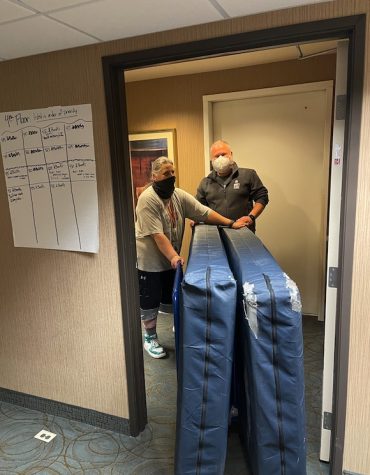Bringing people out of cold amidst COVID
Pandemic, extreme weather makes life harder for homeless population of Seattle
January 18, 2022

The winter of 2022 has brought rising COVID-19 cases and inclement snowy weather to Seattle, forcing much of the city’s homeless population to seek shelter and relief from both the virus and frigid temperatures.
During the recent December snowstorm, there was a massive backlog in demand for shelter which led to a worsening of an already clear and present overcrowding problem in many Seattle area shelters. Filling up spaces during a pandemic comes with its risks, but according to representative Linda Mitchell from the homelessness focused non profit Mary’s Place, this is a risk worth taking.
“When temperatures get below freezing, we have a commitment to bring in every family who needs shelter,” Mitchell said. “We fill every nook and cranny. If you have to choose between freezing and maybe getting COVID, we need to bring families inside.”
According to Mitchell, shelter providers are struggling to cope with rising COVID-19 cases throughout the community they serve, but they are doing the best they can to keep everyone as safe and healthy as possible.
“Like every homeless service provider, we’re in a crisis. We’re being asked to run little hospitals. We need to have shelters in place for families with COVID so they don’t spread it to the rest of the community,” Mitchell said. “We are working really hard to keep everybody safe, offering vaccinations, doing testing, requiring masks, social distancing. We’re taking all the precautions, but it is what it is. It’s not a job you can do remotely.”
Junction Point, another homeless shelter in the Seattle area, is also struggling to address rising pandemic levels in the community they serve. As the virus has spread through their shelter population, it has made its way through their staff as well.
“We have had somewhere around 20 of our residents contract COVID,” said a representative for the organization. “We’ve had about a third of the staff contract COVID as well.”
This has forced Junction Point to make changes to their housing procedures.
“We have dorm rooms for our residents. Because of COVID, we’ve had to switch them into quarantine rooms for the infected. We’ve been trying really hard to keep it under control,” said the representative.
Both Mary’s Place and Junction Point have leaned on the Seattle government to help them address the effects of COVID-19 and the cold in the homeless population. According to Anne Martens, director of external affairs & communications for the King County Regional Homelessness Authority, the city has been working hard to address this issue.
“We opened six emergency overnight shelters with a capacity of 260 people and usage ranged from 65% to 77% full over the severe weather conditions. The city also opened up several community centers at parks to operate as daytime warming centers,” said Martens.
According to Martens, the current severity of the pandemic has forced the city to consolidate its resources and focus primarily on populations with the highest health risks.
“There is a shortage of publicly accessible isolation & quarantine facilities, a shortage of tests and a shortage of staff to run both public health facilities and shelters,” Martens explained. “As a result, public health has changed eligibility standards for isolation quarantine and for their mobile testing team to focus on those who are at highest risk of hospitalization.”
Martens admitted that the recent inclement weather presented an unwelcome challenge for the city amidst already difficult times. She said the city is focused on learning from past challenges to address them better in the future.
“The City held a full debrief and ‘after-action’ review to determine what went well, what the challenges are, and what we should address going forward,” Martens explained. “We know that staffing will continue to be an issue, and we need to look at ways to prepare for that. We also know that snow, heat and smoke are recurring weather issues that should be worked into our regular planning process,”
According to the representative of Junction Point, there is a simple formula the Seattle community can follow to help lower the risk of infection for themselves and the homeless population.
“Stay informed, stay safe and motivate others to get vaxxed.”




























































































